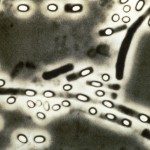Lien vers Pubmed [PMID] – 15210813
J. Immunol. 2004 Jul;173(1):521-30
There is a considerable body of evidence supporting the role of secretory type II-A phospholipase A(2) (sPLA(2)-IIA) as an effector of the innate immune response. This enzyme also exhibits bactericidal activity especially toward Gram-positive bacteria. In this study we examined the ability of sPLA(2)-IIA to kill Bacillus anthracis, the etiological agent of anthrax. Our results show that both germinated B. anthracis spores and encapsulated bacilli were sensitive to the bactericidal activity of recombinant sPLA(2)-IIA in vitro. In contrast, nongerminated spores were resistant. This bactericidal effect was correlated to the ability of sPLA(2)-IIA to hydrolyze bacterial membrane phospholipids. Guinea pig alveolar macrophages, the major source of sPLA(2)-IIA in an experimental model of acute lung injury, released enough sPLA(2)-IIA to kill extracellular B. anthracis. The production of sPLA(2)-IIA was significantly inhibited by B. anthracis lethal toxin. Human bronchoalveolar lavage fluids from acute respiratory distress syndrome patients are known to contain sPLA(2)-IIA; bactericidal activity against B. anthracis was detected in a high percentage of these samples. This anthracidal activity was correlated to the levels of sPLA(2)-IIA and was abolished by an sPLA(2)-IIA inhibitor. These results suggest that sPLA(2)-IIA may play a role in innate host defense against B. anthracis infection and that lethal toxin may help the bacteria to escape from the bactericidal action of sPLA(2)-IIA by inhibiting the production of this enzyme.


